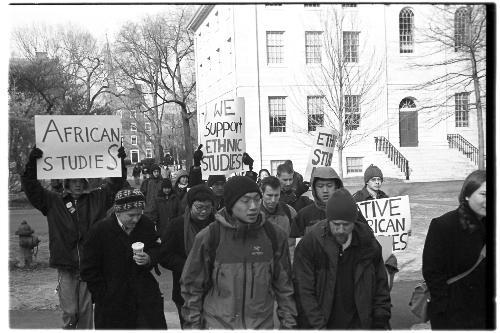
News
Summers Will Not Finish Semester of Teaching as Harvard Investigates Epstein Ties

News
Harvard College Students Report Favoring Divestment from Israel in HUA Survey

News
‘He Should Resign’: Harvard Undergrads Take Hard Line Against Summers Over Epstein Scandal

News
Harvard To Launch New Investigation Into Epstein’s Ties to Summers, Other University Affiliates

News
Harvard Students To Vote on Divestment From Israel in Inaugural HUA Election Survey
Protest Targets Course Diversity

Two dozen students, some with their mouths covered by duct tape, protested yesterday what they call a lack of ethnic diversity in the University’s departments and course offerings.
Students called for more course offerings and new academic departments devoted to the study of specific ethnic groups. Their protest was timed to coincide with a meeting yesterday of the University’s Committee on Ethnic Studies (CES), which oversees course offerings in ethnic studies.
CES has been embroiled in controversy over a plan to offer a certificate program in ethnic studies. Usually, the group’s meetings are open to students but yesterday CES convened behind closed doors to meet with Dean of the Faculty Jeremy R. Knowles, said CES Chair Werner Sollors, professor of Afro-American studies.
Participants called their protest a “silent rally,” saying their voices have gone unheard. Marching from University Hall to the Faculty Club, where CES was meeting, students said they had been fighting for years for more formal recognition of ethnic studies.
“This has been going on since the ’70s, and it is disgraceful that nothing has happened,” said Yumi Lee ’04.
University officials yesterday took issue with the protestors’ claims that there are not enough courses devoted to ethnic studies. Though the College has no formal program to recognize student’s work in that area, dozens of departmental courses currently fall into the field of ethnic studies.
The current list of ethnic studies courses represents “an embarrassment of riches,” said Sollors.
The CES webpage lists dozens of courses related to ethnic studies, including six freshman seminars and offerings in anthropology, Romance languages, government and philosophy.
CES will also hold a conference Feb. 28 for students interested in ethnic studies. Graduate students will discuss their work in that field for the benefit of undergraduates interested in similar pursuits.
And, though yesterday’s meeting was closed, Sollors insisted students have ample opportunity to make their voices heard in the process.
“I’ve always invited students to come to the meetings,” Sollors said.
The rally yesterday went as planned, organizers said, despite internal divisions that had emerged Monday over an e-mail that one organizer had sent to University administrators without consulting other ethnic group leaders.
In an e-mail sent to a long list of Harvard administrators—from University President Lawrence H. Summers down to the members of CES—Ethan Y. Yeh ’03 called for the creation of a general ethnic studies certificate.
But Yeh, who is chair of the Harvard Foundation’s Academic Affairs Committee, did not specifically mention creating separate departments for Latino, Native American and other ethnicities.
Leaders of Latino advocacy groups RAZA and Fuerza Latina wrote to Yeh claiming he had misrepresented their views. They were “saddened and outraged,” the leaders wrote, because he failed to mention the creation of specific departments for each ethnicity.
Yeh, who said he is calling for more diversity of offerings with less specific demands, insisted that the dispute was a simple “misunderstanding” and said sending the letter in the first place was a mistake.
RAZA, Fuerza Latina and Concilio Latino, an umbrella organization for Latino student groups at Harvard’s various schools, threatened to withdraw from yesterday’s rally after Monday’s controversy. But after tensions cooled, they agreed to rejoin the protest.
Sollors said in the fall that he expects CES to come to a decision regarding the certificate proposal by the end of this school year.
Want to keep up with breaking news? Subscribe to our email newsletter.
